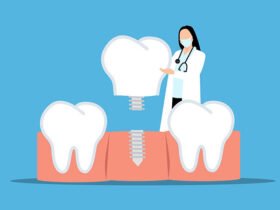Ensuring your child’s dental health is crucial for their overall well-being and development. Good oral hygiene habits established early can lead to a lifetime of healthy teeth and gums.
This guide aims to provide parents with essential information on how to take care of their kids’ dental health effectively.
The Importance of Early Dental Care
Starting dental care early is essential for a child’s oral health. Baby teeth, although temporary, play a significant role in a child’s development. They help with chewing, speaking, and maintaining the space for permanent teeth. Healthy baby teeth set the foundation for healthy adult teeth.
Begin dental care even before your child’s first tooth appears. Clean their gums with a soft, damp cloth after feedings to remove bacteria. Once the first tooth emerges, start brushing with a soft-bristled toothbrush and a smear of fluoride toothpaste. By the age of two, you can begin flossing your child’s teeth.
Schedule your child’s first dental appointment by their first birthday. Regular check-ups allow the dentist to monitor the development of your child’s teeth and catch any potential issues early. Establishing a relationship with a dentist early on also helps your child become comfortable with dental visits, reducing anxiety in the future.
Finding a Pediatric Dentist
Choosing the right pediatric dentist is important for your child’s dental health. Pediatric dentists specialize in treating children and are trained to handle their unique dental needs and behaviors. Look for a dentist who is friendly, patient, and experienced in working with kids.
When searching for a pediatric dentist, consider asking for recommendations from friends, family, or your child’s pediatrician. Reading online reviews can also provide insights into the experiences of other parents. Visiting the dentist’s office beforehand can help you assess the environment and determine if it is child-friendly and welcoming.
If you need specific dental services, such as fillings, finding a local provider is essential. You can search the keyword dental fillings near me on any search engine to find reputable clinics nearby. A comfortable and well-equipped dental office can make a significant difference in your child’s experience and willingness to return for future visits.
Establishing a Daily Oral Hygiene Routine
A consistent daily oral hygiene routine is vital for maintaining your child’s dental health. Start by teaching your child the proper way to brush and floss their teeth. Encourage your child to brush for at least two minutes twice a day, focusing on all surfaces of the teeth.
Show your child how to gently floss between teeth to remove food particles and plaque. For younger children, you may need to assist with brushing and flossing until they develop the skill to do it effectively on their own.
Making dental care fun can help encourage your child to stick to their routine. Use colorful toothbrushes, flavored toothpaste, and even songs or timers to make brushing enjoyable. Positive reinforcement, such as a sticker chart or small rewards, can also motivate your child to maintain good oral hygiene habits.
The Role of Diet in Dental Health
Diet plays a significant role in your child’s dental health. A balanced diet that includes a variety of nutrients is essential for the development and maintenance of healthy teeth and gums.
Certain foods are particularly beneficial for dental health. Dairy products like milk, cheese, and yogurt are rich in calcium and vitamin D, which are crucial for strong teeth and bones. Crunchy fruits and vegetables, such as apples and carrots, increase the production of saliva, which cleans the mouth naturally and neutralizes acids.
On the other hand, some foods and drinks can harm dental health. Limit sugary snacks and beverages, as sugar can lead to tooth decay. Sticky and chewy foods, such as candies and dried fruits, can cling to teeth and promote plaque buildup. Encourage your child to drink water instead of sugary drinks and to rinse their mouth with water after consuming sugary or acidic foods.
Understanding Fluoride and Sealants
Fluoride and dental sealants are effective tools in preventing cavities and maintaining dental health. It is found in various sources, including toothpaste, mouth rinses, and even tap water in some areas.
Your dentist may recommend fluoride treatments during routine check-ups, especially if your child is at high risk for cavities. These treatments involve applying a concentrated fluoride gel or varnish to the teeth, providing additional protection against decay.
Dental sealants are another preventive measure. Sealants are thin, protective coatings applied to the chewing surfaces of the back teeth, where cavities are most likely to form. The sealant forms a barrier, protecting the enamel from food particles and bacteria. Applying sealants is a quick and painless procedure that can significantly reduce the risk of cavities.
Discuss fluoride and sealant options with your dentist to determine the best preventive measures for your child. Early intervention and preventive care can save your child from more extensive dental treatments in the future.
Managing Common Dental Issues
Common dental issues such as cavities, gum disease, and tooth sensitivity can affect children just as they do adults. Understanding these problems and knowing how to prevent them can help keep your child’s mouth healthy.
Cavities are one of the most prevalent dental issues in children. They occur when plaque, a sticky film of bacteria, builds up on the teeth and produces acids that erode tooth enamel. Regular brushing and flossing can help prevent plaque buildup. Additionally, limiting sugary snacks and drinks can reduce the risk of cavities. Regular dental check-ups are crucial for catching cavities early and treating them before they become more severe.
Tooth sensitivity can be uncomfortable for children, making it difficult to eat hot or cold foods. Sensitivity often results from enamel erosion or gum recession. Using toothpaste designed for sensitive teeth and avoiding acidic foods and drinks can help manage sensitivity. If your child complains of tooth sensitivity, consult your dentist to identify the cause and appropriate treatment.
To Sum It Up
Your child’s dental health is an ongoing journey that benefits immensely from early and consistent care. By fostering good habits and maintaining regular dental visits, you contribute significantly to their long-term oral health.
Remember, a proactive approach and positive reinforcement can make dental care a natural and enjoyable part of your child’s routine. Taking these steps not only ensures healthy teeth and gums but also instills confidence and well-being that lasts a lifetime.










